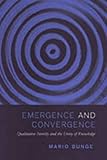Emergence and Convergence : Qualitative Novelty and the Unity of Knowledge / Mario Bunge.
Material type: TextSeries: Toronto Studies in PhilosophyPublisher: Toronto : University of Toronto Press, [2003]Copyright date: ©2004Description: 1 online resource (320 p.)Content type:
TextSeries: Toronto Studies in PhilosophyPublisher: Toronto : University of Toronto Press, [2003]Copyright date: ©2004Description: 1 online resource (320 p.)Content type: - 9780802088604
- 9781442674356
- 003/.01
- Q175
- online - DeGruyter
| Item type | Current library | Call number | URL | Status | Notes | Barcode | |
|---|---|---|---|---|---|---|---|
 eBook
eBook
|
Biblioteca "Angelicum" Pont. Univ. S.Tommaso d'Aquino Nuvola online | online - DeGruyter (Browse shelf(Opens below)) | Online access | Not for loan (Accesso limitato) | Accesso per gli utenti autorizzati / Access for authorized users | (dgr)9781442674356 |
restricted access online access with authorization star
http://purl.org/coar/access_right/c_16ec
Two problems continually arise in the sciences and humanities, according to Mario Bunge: parts and wholes and the origin of novelty. In Emergence and Convergence, he works to address these problems, as well as that of systems and their emergent properties, as exemplified by the synthesis of molecules, the creation of ideas, and social inventions.Along the way, Bunge examines further topical problems, such as the search for the mechanisms underlying observable facts, the limitations of both individualism and holism, the reach of reduction, the abuses of Darwinism, the rational choice-hermeneutics feud, the modularity of the brain vs. the unity of the mind, the cluster of concepts around 'maybe,' the uselessness of many-worlds metaphysics and semantics, the hazards posed by Bayesianism, the nature of partial truth, the obstacles to correct medical diagnosis, and the formal conditions for the emergence of a cross-discipline.Bunge is not interested in idle fantasies, but about many of the problems that occur in any discipline that studies reality or ways to control it. His work is about the merger of initially independent lines of inquiry, such as developmental evolutionary biology, cognitive neuroscience, and socio-economics. Bunge proposes a clear definition of the concept of emergence to replace that of supervenience and clarifies the notions of system, real possibility, inverse problem, interdiscipline, and partial truth that occur in all fields.
Mode of access: Internet via World Wide Web.
In English.
Description based on online resource; title from PDF title page (publisher's Web site, viewed 01. Nov 2023)


